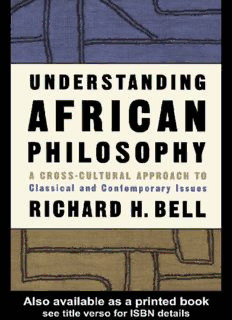
Understanding African Philosophy: A Cross-cultural Approach to Classical and Contemporary Issues PDF
Preview Understanding African Philosophy: A Cross-cultural Approach to Classical and Contemporary Issues
UNDERSTANDING AFRICAN PHILOSOPHY This page intentionally left blank. UNDERSTANDING AFRICAN PHILOSOPHY A CROSS-CULTURAL APPROACH TO Classical and Contemporary Issues RICHARD H.BELL ROUTLEDGE NEW YORK AND LONDON Published in 2002 by Routledge 29 West 35th Street New York, NY 10001 Published in Great Britain by Routledge 11 New Fetter Lane London EC4P 4EE Routledge is an imprint of Taylor & Francis Group. This edition published in the Taylor & Francis e-Library, 2004. Copyright © 2002 by Routledge All rights reserved. No part of this book may be reprinted or reproduced or utilized in any form or by any electronic, mechanical, or other means, now known or hereafter invented, including photocopying and recording or in any information storage or retrieval system, without permission in writing from the publishers. Design and typography: Jack Donner 10 9 8 7 6 5 4 3 2 1 Library of Congress Cataloging-in-Publication Data is available from the Library of Congress. Understanding African Philosophy/Richard H.Bell ISBN 0-203-80074-5 Master e-book ISBN ISBN 0-203-80077-X (Adobe eReader Format) ISBN 0-415-93936-4 (Print Edition)—ISBN 0-415-93937-2 (pbk.) To my wife and children, Barbara, Jonathan, & Rebecca: you have given me great joy in life This page intentionally left blank. contents P reface x A cknowledgments xvi ii 1. U nderstanding Another Culture 1 Understanding Others and Ourselves A Procedure from an Aesthetic Point of View “Found in Translation” 2. F oundations of Modern African Philosophy 2 1 Ethnophilosophy and the “Negritude” Movement Critical, Scientific Philosophy Sage Philosophy 3. L iberation and Postcolonial African Philosophy 3 6 African Humanism and Socialism Postcolonial African Thought The Question of “Race” 4. A frican Moral Philosophy I: Community and Justice 5 8 Persons, Individualism, and Communalism Suffering and Injustice Poverty and Human Development 5. A frican Moral Philosophy II: Truth and Reconciliation 8 3 Linking Communalism, Ubuntu, and Restorative Justice Understanding the Grammar of Justice after Apartheid “Not All Storytelling Heals”: Criticisms of the TRC Process Justice and Political Transformation 6. N arrative in African Philosophy: Orality and Icons 10 6 The Philosophical Significance of Oral Narratives Rational Dialogue, Democracy, and the Village Palaver Finding Pictures and Fictitious Narratives “Surprising” viii UNDERSTANDING AFRICAN PHILOSOPHY Iconic Forms and the Aesthetic Consciousness Revisited 7. S ome Concluding Remarks 13 2 N otes 13 6 B ibliography 17 1 I ndex 18 1 Seriously to study another way of life is necessarily to extend our own. —Peter Winch
Description: